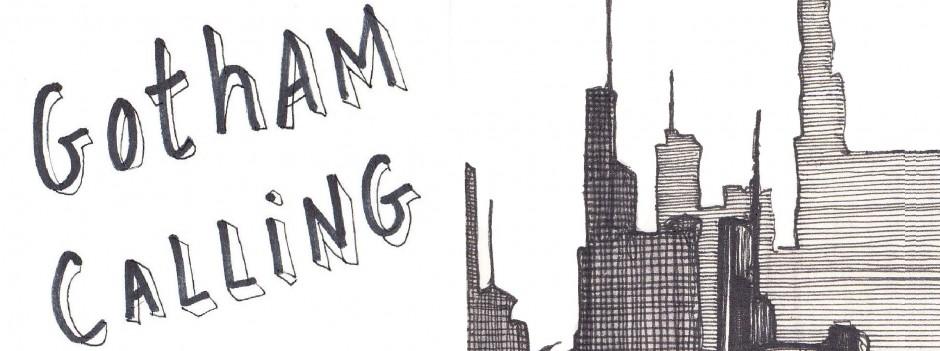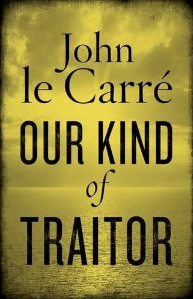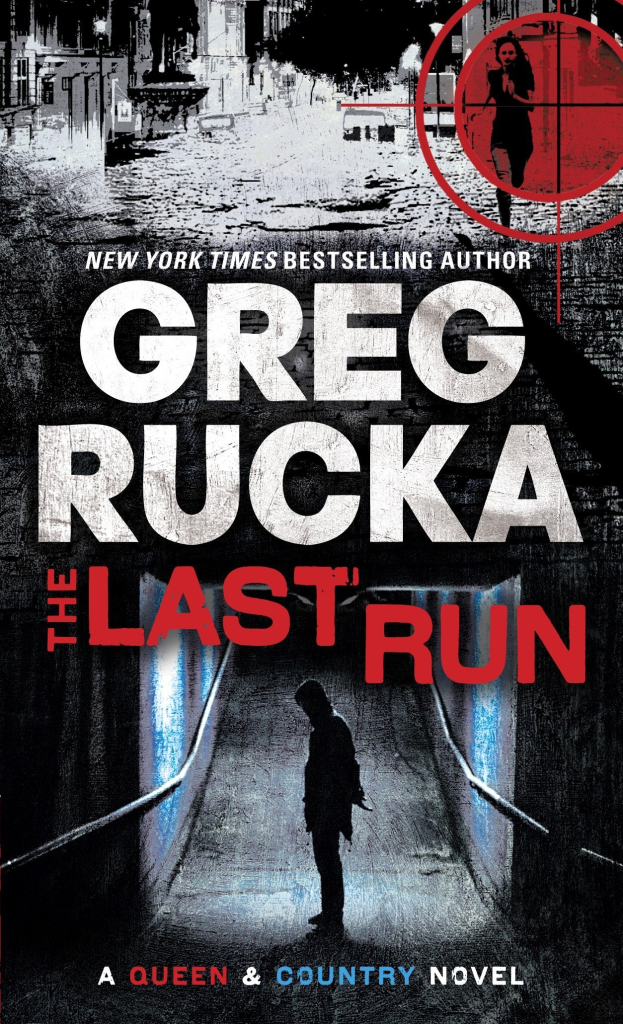Shifting gears for a bit, today let’s talk about a couple of cool books without drawings that came out almost a decade ago…
OUR KIND OF TRAITOR
(John le Carré, 2010)
“At seven o’clock of a Caribbean morning, on the island of Antigua, one Peregrine Makepiece, otherwise known as Perry, an all-round amateur athlete of distinction and until recently tutor in English literature at a distinguished Oxford college, played three sets of tennis against a muscular, stiff-backed, bald, brown-eyed Russian man of dignified bearing in his middle fifties called Dima. How this match came about was quickly the subject of intense examination by British agents professionally disposed against the workings of chance. Yet the events leading up to it were on Perry’s side blameless.”
John le Carré, the absolute master of the sophisticated spy novel, penned this no-frills thriller about a bourgeois British couple who, during a tennis-playing holiday in the Caribbean, cross paths with a Russian oligarch and soon find themselves embroiled in a shady web of international intrigue. Although much less ambitious than le Carré’s classic, sprawling Cold War epics, Our Kind of Traitor is nevertheless a gripping page-turner that benefits from the veteran writer’s sharp wit and characterization, not to mention his usual digs at the political climate (in this case, at the floods of criminal Russian money pouring into the British establishment).
Unless you’re new to the game, you’ve probably seen some of this before. It’s one of those Hitchcockian ventures in which naïve civilians enter the world of espionage, their amateurish goodwill pitted against the plots of cynical, seasoned professionals. Le Carré had already mined this territory in Absolute Friends, The Tailor of Panama, The Mission Song, The Night Manager, and Single & Single (which also dealt with the Russian mob) among others, doing countless variations on the scene where a handler at the MI6 teaches the hero about the basic rules of the job. Yet here le Carré has fun twisting some of the old formulas, for example with this prep speech that the couple gets just before a crucial stage of the operation:
“This is not, repeat not, a training session. We don’t happen to have a couple of years to spare: just a few hours spread over a couple of weeks. So it’s familiarization, it’s confidence-building, it’s establishing trust in all weathers. You in us, us in you. But you are not spies. So for Christ’s sake don’t try to be. Don’t even think about surveillance. You are not surveillance-conscious people. You’re a young couple enjoying a spree in Paris. So don’t for fuck’s sake start dawdling at shop windows, peering over your shoulders or ducking into side alleys.”
Le Carré’s storytelling is a delight, as usual. We get a third-person subjective narrator whose viewpoint shifts from chapter to chapter (and later from subsection to subsection, during the suspenseful climax), giving us insight into the perspectives of various players. After a first act revolving mostly around the couple’s experience, the focus moves to the UK’s secret services – against the background of the financial crisis and austerity policies – and suddenly the narrative gains a new set of layers. As the final pages approach, we feel as powerless as the protagonists, knowing that machinations are taking place somewhere far away… their fate is in the hands of forces beyond their control. There is the typical amount of loose ends, some of them fueling the overall paranoia, some of them leaving us with the haunting responsibility of imagining what happened to the handful of characters left unaccounted for by the end.
Expect lyrical descriptions of tennis matches, especially during the sequence at the French Open final, which cannot help but bring to mind Alfred Hitchcock’s Strangers on a Train.
THE LAST RUN
(Greg Rucka, 2010)
“For Tara Chace, it was the fall that did it, the absurdly long pause that came between missing the handhold and slamming into the ground. Like all falls that are too far, this one lasted long enough for her to realize what happened, and what, as a result, would inevitably happen next. It was a moment of perfect clarity; not of vision, but of self-awareness, and Chace saw herself then as she had only four other times in her life. She saw herself as the woman she was – frankly, honestly, without self-pity, judgment, or false modesty. Who she was, who she had been, and who she wished to be.
Then she hit the ground, her back impacting first, followed almost immediately by her skull.”
There are different ways you can approach The Last Run. You can approach it as the final volume in Greg Rucka’s trilogy of gritty novels about MI6 agent (aka ‘minder’) Tara Chace. You can approach it as the culmination of the excellent comic book series Queen & Country (itself a sort of unofficial sequel/quasi-remake of the brilliant TV show The Sandbaggers). Or, if you’re late to the party, you can just read it as a self-contained tale, since Rucka conveys all the background you need about the characters and the intricate administrative framework of the British intelligence branch. In any case, make sure you check out this page-turner about an operation to lift an important Iranian defector, told in a taut, realistic style and building up to a surprising payoff.
The two previous novels in the series – 2004’s A Gentleman’s Game and 2005’s Private Wars – were both great spy thrillers about the War on Terror. Despite providing several tense action set pieces, what made those books stand out was the weight given to the bureaucracy and infighting within the secret services. Everyone had an ulterior agenda and Rucka excelled at bringing those agendas together… and often pitting them against each other! I especially like Private Wars, which is one hell of a yarn revolving around a couple of missions in Uzbekistan, a real setting (with some creative tweaking) whose brutal description packs a punch. There is some nasty stuff in there (including a couple of torture scenes that are pretty hard to stomach), but it’s still a much more intelligent and thought-provoking novel than the trashy cover suggests.
The Last Run keeps the series’ best traits, including its moral ambiguity. Once again, we don’t get just the MI6’s perspective – we also spend plenty of time with its opponents (in this case, with a unit of Iran’s Ministry of Intelligence and Security), fleshing them out and complexifying what could’ve been a facile narrative of heroes and villains. And once again, the book doesn’t shy away from telling us how ruthless both sides can be, in specific circumstances.
In terms of writing, Rucka maintains a smooth pace, often toying a bit with time within each chapter to keep readers on the edge. His prose is not particularly rich in terms of language, but his storytelling is top-notch, including the kind of attention to detail that effectively sells you on the cast’s astuteness and professionalism.
“‘I’m a marine biologist?’
Teagle slid a folder across the briefing table towards her. ‘You can read up on it. You’ve published a couple of very well-received papers on the subject, in point of fact. It’s a very good cover for the job, Tara. Of all the countries on the Caspian, Iran is the only one to make any effort at sustaining the sturgeon population, and they’re quite proud of the fact.’
‘I never did like caviar,’ Chace said, leafing through the folder.
‘The cover also justifies why you’ll be in the north, why you’ll have access to a boat, why you’ll be carrying a GPS, a sat phone. You can even get away with carrying a knife, if you like. After all, you’ve got to open those fish somehow.’”
All in all, The Last Run – like the rest of the Queen & Country series – should be required reading for any fan of the genre. There are codes and dead drops and double-crosses and enough tradecraft to fill a manual. There are long stretches of political discussions and backroom deals, but also bursts of vicious violence that suddenly shift the narrative. Moreover, Tara Chace continues to be a tough, resourceful operative with just enough vulnerability to make her a truly engrossing protagonist. Let’s hope Rucka brings her back soon, somehow!


